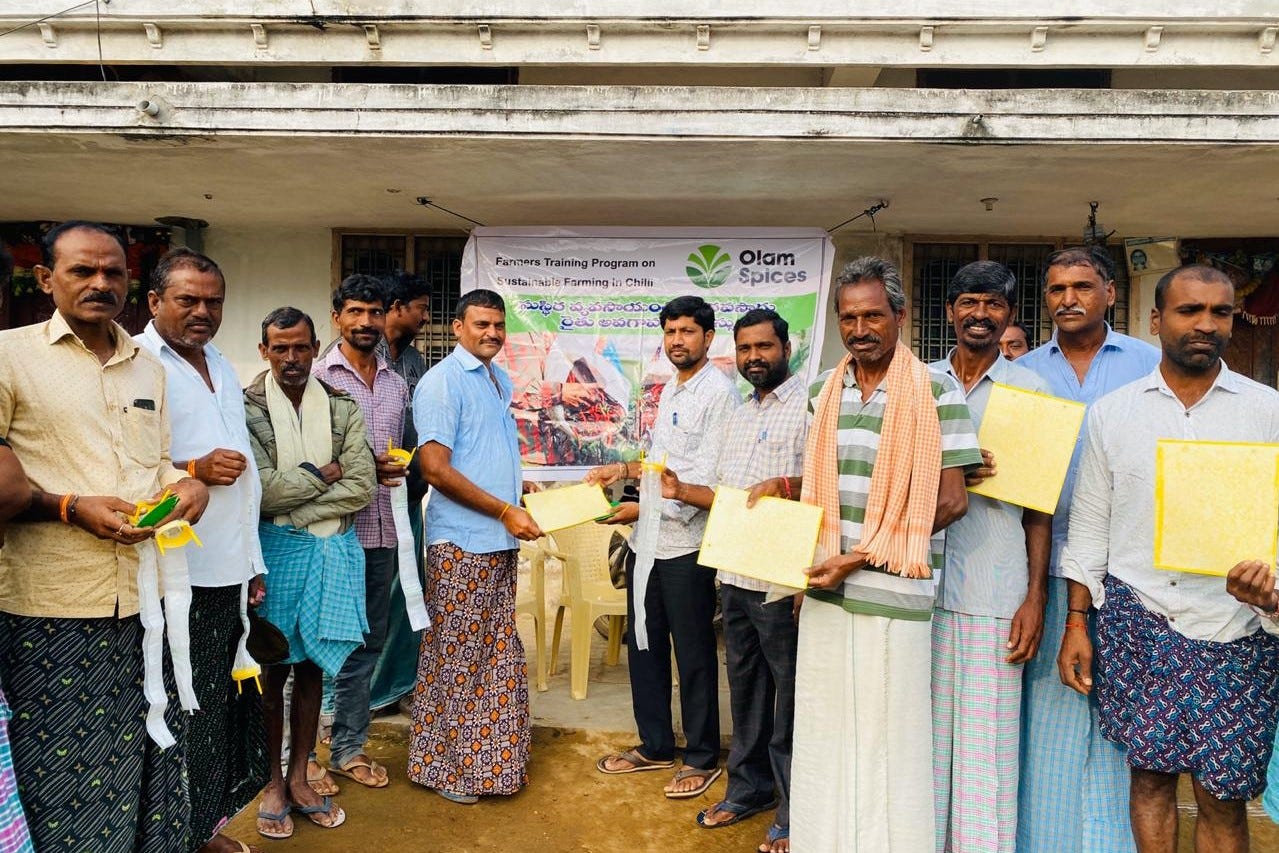Download Newsletter
Tired of scrolling? Download a PDF version for easier offline reading and sharing with coworkers.
Download NowGrowing Responsibly: The Official Olam Spices Sustainability Newsletter
Volume 3 - Issue 2
June 2020
Re-Generating the Living World


Leaping Towards More Sustainable Supply Chains
Olam Spices’ chili and turmeric products have earned a new seal, one with the little green frog aka the Rain Forest Alliance (RFA) certification. Both supply chains, which consist of 100+ farmers and over 140 hectares of land, are now certified to supply over 600 metric tons of RFA chili and turmeric.
Throughout the process, we worked closely with farmers to implement biodiversity conservation practices such as incorporating border and native trap crops to attract beneficial insects and reduce pest pressure along with pesticide applications.
Farmer trainings were conducted across multiple categories of natural resource conservation including soil and water management, waste management and safe use and handling of pesticides. Growers were also given fertilizer recommendations based on individual soil health tests, waste management programs were implemented on their farms and personal protective equipment (PPE) was distributed.
In an effort to enhance farmer livelihoods and human well-being, sessions on labor laws, covering fair wages and child labor were conducted in local languages. Assessments were also conducted to ensure farm workers were provided access to clean drinking water and sanitary facilities and that any occupational hazards were identified.
The ultimate goal of these initiatives is to help our chili and turmeric farmers improve yields and crop quality, while reducing the cost of cultivation — thereby increasing the net returns to the farmer.


A Deeper Glance at Sustainable Spices
Olam’s new agricultural systems management tool, AgInsight, has officially launched in the United States for the 2021 crop season. AgInsight will provide further data into the sustainability of our AtSource verified, onion, garlic, parsley and chili supply chains.
Our crop managers, who visit our growers’ fields to regularly monitor crops and troubleshoot any potential problems or successes, will now be equipped with AgInsight. The daily notes they record on pests, chemical applications, water dates, the status of the crop and any comments or concerns shared by the farmer, will automatically be geotagged to the field they are standing in, with the date and time.
Additional metrics collected through AgInsight include details on farm energy use, pesticide and fertilizer use, water use, details on biodiversity, soil health and additional characteristics unique to the farm. These data points will be used to develop environmental footprints for crops and grower regions visualized through AtSource, as well as provide trend data to compare changes in the data over time.
The AgInsight system will be used to connect the farmer to the hauler and processor — ensuring full traceability, fair labor standards and sustainability along the way.
Prosperous Farmers and Farming Systems


Treating Pepper Patients
On our pepper estate in Vietnam, we have been working with the Centre for Agriculture and Bioscience International (CABI) to train our staff as Plant Doctors. The goal of the CABI program is to achieve higher yields with improved crop quality by building the capacity of field staff to quickly and effectively diagnose and treat pepper plants.
Currently, there are 14 trained Plant Doctors in the Gai Lai province who have enhanced their skills in pest and disease management, field practices for pepper cultivation, plant nutrition and field diagnosis.
Two of the deadliest diseases affecting pepper plants are quick wilt disease, a soil-borne pathogen, and fusarium root rot. If these diseases are not diagnosed early they can kill the plant in just a few weeks. To counter these diseases the Plant Doctors are trained to identify plant ailments early and treat the plant quickly, at the appropriate time, while minimizing chemical usage.


Responsibly Sourced Cumin
In India, 600 cumin farmers in the Barmer region of Rajasthan have been selected to take part in our “Responsible Sourcing Program,” a partnership between Nestle and Olam. The program trains farmers on topics related to the United Nations Sustainable Development Goals, including Good Agricultural Practices (GAP), labor rights, child labor, education and conservation.
In the Barmer region, soils tend to be sandy with lower nutrient availability, therefore a main focus of the program has been on soil health improvement. To help farmers enhance soil quality and reduce chemical application, they were trained on how to implement Integrated Pest Management (IMP) principles, utilize land leveling to decrease weeds and apply organic products. Ultimately, the techniques have resulted in positive outcomes for growers, who report increases in yield that offset investments in higher quality chemicals.
We also held trainings on green manuring and optimum fertilizer application, which offer the dual benefit of increased productivity while decreasing costs to farmers. As our cumin growers continue to reap the benefits from the trainings, they have been sharing methods and success stories within the community and encouraging other farmers to adopt more sustainable practices.
Thriving Communities


Healthy Communities
Olam Spices is working to support grower and community health in India through medical camps. Recently, we held a medical camp for 75 people, 32 farmers and their families, to teach them about pesticide safety, first aid and symptoms of pesticide poisoning.
To test the health of community members, blood tests were conducted to check for the cholinesterase enzyme for all community members involved in spraying pesticides, as pesticide exposure can bind the enzyme and reduce levels in the blood. First aid kits were also distributed to farmers and community members.
Read our latest market reports and blogs


The US CY20 onion planting is ~90% complete and planted acreage is likely to be similar to the last season. Precipitation has tapered off over the past few weeks; however, overall winter weather conditions have been favorable.


Chilies crop and market scenario.
- After a 20 day delay, harvest has started across major growing areas
- Overall acreage is likely to be same as last year with better yield expectations...


Whether they’re eating a frozen entrée or dipping into the signature aioli at their favorite burger spot, consumers crave fresh flavor. So, how do food manufacturers and restaurants ensure that they get the same fresh flavor year-round?
Meet your secret weapon ingredient, GardenFrost™, Olam Spices’ proprietary line of soft-frozen, quick thaw purées.
